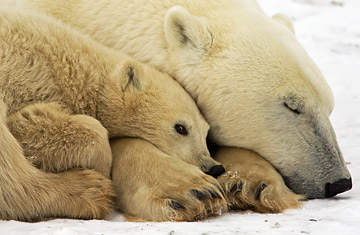
A mother polar bear sleeps on the frozen tundra with her cub.
The environmental movement has marked its advancement in a series of caps and cutoffs and deadlines. On Jan. 9, one of those targets came and went: The Fish and Wildlife Service (FWS), the Interior Department agency that evaluates endangered species, was due that day to deliver its ruling on the polar bear. Though FWS had already taken over a year to investigate the polar bear's plight — green groups sued the federal government two years ago to declare the animal as threatened under the Endangered Species Act — the day before the deadline, the agency announced that it would need another month to decide, due to the complexity of the bear's situation.
That situation is as follows: As temperatures warm, the Arctic sea ice that supports the polar bear shrinks, leaving the animals to drown as they are forced to swim long distances between the ice, or simply starve to death. The summer of 2007 saw record melting of Arctic sea ice, and NASA scientists now predict that the Arctic could be ice-free as soon as the summer of 2013. "Without the sea ice, there is no polar bear," says Andrew Wetzler, director of the Natural Resource Defense Council's endangered species project. Indeed, a study by the United States Geological Service in September 2007 projected that the polar bear population — which currently stands at roughly 25,000 — could decline two-thirds by 2050.
Now the bears face another threat. On Feb. 6 — three days before FWS's new deadline — the Minerals Management Service (MMS), also part of the Interior Department, plans to lease 30 million acres for oil and gas drilling in the Chukchi Sea bordering Alaska, where one-fifth of the world's remaining polar bears live. Drilling — with the risk of spills and seismic damage — could further jeopardize the polar bear, and environmentalists consider it suspicious that FWS decided to delay its decision until after the lease sale. "It seems that every time there is a choice between extraction and extinction in this administration, extraction wins," said Rep. Ed Markey, the chairman of the House Select Committee on Energy Independence and Global Warming, at a hearing on the issue held Thursday.
Speaking at the hearing, MMS Director Randall Luthi defended the lease sale, arguing that developing fossil fuels in the Arctic needn't hurt the polar bear — although an Interior Department study indicates there's a 33% to 51% chance of an accidental oil spill in the area. At the conclusion of the hearing, Markey introduced legislation that would force the Bush Administration to protect the polar bear before it allows further oil drilling in Alaska, setting up a showdown later this month.
But the fate of the polar bear goes beyond a single oil and gas project. If the species is declared threatened, FWS will have responsibilities under the Endangered Species Act to protect the bears from their main danger — in this case, climate change. That means the government could be challenged legally for anything that increases carbon dioxide emissions — like a new coal power plant — on the grounds that further climate change would further endanger the polar bear. "It would be the first time that the Bush Administration would recognize that global warming had a significant and specific impact on a living being," says Eben Burnham-Snyder, a spokesperson for Markey. "This could have a wide-ranging effect on the energy and environmental policies of this country."
That's a positive spin, but the reality is that FWS will only have limited ability to deal with global warming — and the polar bear is only the first of countless millions of species that could be forced into extinction because of rising temperatures. Conservationists are facing the depressing possibility that all the effort of the past several decades to save endangered species — controlling poaching, creating wildlife reserves, banning animal trade — may be for naught if climate change continues unchecked. In a drastically warmer world, habitats for many species — like the polar bear — could simply disappear, taking the animals with them. Nearly one-third of the world's animals are already under the threat of extinction, and the current rate of species loss is 10,000 times the natural rate. "Global warming has such far-reaching implications [for conservation] that it's very depressing," says Kert Davies, research director for Greenpeace. "Those are the thoughts that send me to the bar." It could start with polar bears, but if we can't get a handle on climate change, one more species might end up threatened: us.
